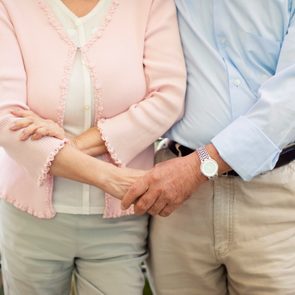Are You in an Unhealthy Relationship? Here’s How to Tell
Updated: Jun. 30, 2022
Relationship experts reveal the telltale signs of an unhealthy relationship, plus how to know if it's time to end it.
Understanding unhealthy relationships
It’s a common story for many people: You spend years in a relationship, only—once you finally split up—to have your friends or family tell you how thrilled they are it’s over.
While you might be happy to end the relationship, the reaction from your loved ones still stings. In retrospect, you wonder how you could have been so blind to the signs. But what exactly are the signs of an unhealthy relationship? (Here are the telltale signs you’re in a toxic relationship.)
Among them, it’s possible that your body can be affected by an unhealthy relationship, says Jessica Griffin, licensed clinical and forensic psychologist, associate professor of psychiatry and pediatrics at the University of Massachusetts Medical School in Worcester.
And if an unhealthy relationship turns into emotional abuse, it can have negative physiological effects, right down to your DNA, Griffin says. Those in long-term psychologically abusive relationships are exposed to ongoing toxic stress from emotional abuse. This stress on the body can even sometimes manifest itself as increased headaches, stomachaches, increased inflammation in the body, and compromised immune systems if the stress state is long-term, according to Griffin.
While the signs of an unhealthy relationship are numerous, another classic tell is feeling like you need to hide your accomplishments or plans from your partner out of fear of them getting jealous, Griffin says.
What are the dynamics of unhealthy relationships?
“The dynamics in an unhealthy relationship will ultimately lead to conflict, emotional unrest, and tension,” says Regine Muradian, a clinical psychologist in Los Angeles.
She adds, “We are not just talking about romantic relationships but any type of relationship. This could be a friend, family member, or a coworker.” In a relationship, there needs to be a balance in the exchange of power, Muradian says.
For example, “If a person feels their needs are not met and they don’t communicate about it, conflict and tension will occur. Avoidance and withdrawal can also materialize which creates an unhealthy balance and ultimately unhappiness with both parties,” Muradian says. (These are the types of anger to look out for.)

You feel physically or emotionally damaged
At its core, an unhealthy relationship will leave you feeling physically or emotionally damaged, says Abisola Olulade, MD, a board-certified family medicine physician with Sharp Rees-Stealy Medical Group in San Diego.
Although people in long-term relationships will have good days and bad days—or even good months and bad months, or longer—unhealthy relationships are characterized by a seesaw that weighs heavily, and consistently, negative.
“Every relationship goes through ups and downs, but in unhealthy relationships, the negative moments outweigh the positive ones,” Dr. Olulade explains. (Here are some abusive relationship quotes to help you move on.)
And unhealthy relationships aren’t necessarily confined to your romance. “Familial relationships and friendships can also be unhealthy,” says Dr. Olulade. (Here’s how to figure out the difference between a healthy vs. unhealthy relationship.)
Here are even more signs that you’re in an unhealthy relationship—with tips on how to address it and advice on when to consider finally ending it. (Then, read the characteristics of a healthy relationship.)
The person tries to control you
While most relationships are characterized by a division of duties—perhaps you split childcare 50/50, perhaps one partner tackles household repairs while the other is in charge of taxes—if there is an extreme imbalance of power in the relationship, this is an unhealthy sign, says Bethany Cook, clinical psychologist, health service psychologist, and author of For What It’s Worth: A Perspective on How to Thrive and Survive.
Cook cites finances as an example, with one partner using their earnings as “bait to control the couple’s finances.” If your spouse makes more money than you and then uses it as leverage to bait, guilt, or control you, this is problematic and unhealthy.
There is a lack of communication
Clear communication is an essential component of a healthy relationship, explains Stephanie Newman, a psychoanalyst and psychologist in New York. Without it, even the best relationship can start to sour. “Partners should make a point of agreeing to resolve disputes. The process of airing out grievances and addressing concerns should be regular and ongoing,” Newman says. However, not just failing to communicate but actively avoiding it is another sign.
Muradian agrees that communication in relationships is essential. “A lack of communication is one of the first signs of an issue in any type of relationship,” she says. “If something is disturbing, let the person know so you can find a way to resolve the conflict. Sometimes a disagreement may remain unresolved despite your attempt to sort it out, but the fact that you tried is a positive move forward.”
(Want to build more trust in your relationships? Here’s how to do it.)
You feel isolated
“Unhealthy relationships often have elements of abuse,” says Dr. Olulade, noting that it can have many different facets. “This can be physical, such as hitting, threatening, beating, slapping, grabbing, shoving, kicking, biting, sexual, such as unwanted sexual touching or forcing someone to engage in unwanted sexual activity, and psychological or emotional,” she says.
Isolation is a classic and very common hallmark, Dr. Olulade explains. If your partner is trying to cut you off from family or friends, tracking your cell phone usage, or is monitoring who you spend time with, these are all warning signs.
Other hallmarks of an unhealthy relationship include humiliating you by putting you down in public or coercing you by threatening to hurt themselves if you leave them.
“Threatening to do any of these things is also common and is also abusive,” Dr. Olulade warns.
Cook identities a controlling partner as both unhealthy and abusive.
“Offering a comment like ‘Hey honey, I know X from high school, and they can get a little nuts sometimes, just a heads up, k?’ is fine. What’s not OK is saying something like ‘I don’t want you hanging out with X anymore, ever. You do and you’ll deal with me,'” she says.
Ultimately, a controlling partner who insists it’s their way or the highway is a classic sign of an unhealthy relationship.
(Isolation and loss of control are just two signs of an emotionally abusive partner. Here are more things women in former abusive relationships want you to know.)
You don’t feel safe or secure
Cook details a litany of other signs that your relationship may not be healthy, including your partner asking you to do things that make you uncomfortable, worrying about your physical safety when your partner gets angry, or feeling lonely when you’re with your partner.
At the end of the day, says Cook, if you don’t feel safe or secure in the relationship, this can’t be ignored. (These are the best ways to deal with anger.)
Threat of cyber abuse
If your partner is threatening cyber abuse, such as releasing intimate photos of you if you don’t agree with them or to punish you for past behaviors, this is also unhealthy, says Dr. Olulade, noting that it can sometimes be difficult to identify when you’re experiencing it.
“People experiencing abuse may deny it for several reasons. They may blame themselves and feel like they are at fault, they may not be emotionally ready to admit that the abuse is happening, they may fear rejection, they may feel ashamed, may fear retaliation by their abuser, or may believe they have no other alternatives,” she says.
Whatever the trigger, says Dr. Olulade, “if a relationship affects your mental health in a negative way, then this is a sign that you may be in an unhealthy relationship.” (Fighting all the time with your partner? Here are some tips to improve your conflict resolution.)
When to seek professional help
It’s worth taking the time to differentiate between an unhealthy relationship and an unfulfilling relationship, as they’re not the same thing, explains Dr. Olulade.
Your partner might be kind and loving, but you could have different goals or external circumstances that prevent you from spending as much time together as you want. These issues are worthy of seeking professional help to see if the relationship can be improved, but they don’t necessarily signal an unhealthy or harmful relationship.
However, regardless of the reasons behind your issues, big or small, seeking professional help is always OK, says Dr. Olulade. (Here’s how to find a therapist.)
“It’s important that you can end a relationship if you want to and sometimes you may not even fully understand the reasons why. You should always feel the freedom to be able to do so. If any of the above warning signs or red flags are present and/or you feel that you cannot end the relationship on your own, then you should seek help for this,” says Dr. Olulade.
“SAFE” questions
Dr. Olulade recommends several resources, including the National Domestic Violence Hotline, available for guidance 24/7 guidance, and mentions the “SAFE questions”:
- Stress/Safety: Do you feel safe in your relationship?
- Afraid/Abused: Have you ever been in a relationship where you were threatened, hurt, or afraid? (Here are domestic violence signs.)
- Friend/Family: Are your friends aware you have been hurt?
- Emergency plan: Do you have a safe place to go and the resources you need in an emergency?
Consider the above and don’t hesitate to seek outside assistance.
“If you are in physical danger you should seek help immediately,” Dr. Olulade says.
When you start questioning it
For Cook, the right time to seek professional help for an unhealthy relationship is as soon as you start questioning it.
“As soon as you realize things aren’t going well in a relationship, you need to stop, take a step back, and reassess what’s going on. Reflect on what it is you want from the relationship, what you think is limiting you and your partner from achieving it, and whether or not you want to continue investing in this relationship or simply break-up,” says Cook.
Cook advises against waiting to see if things simply “work themselves out” and instead recommends taking charge.
“When your toilet gets clogged you don’t wait to see if it can ‘work itself out,’ you actively do something to fix it,” she says. “We need to start thinking about relationships like this. If things are heading south, be proactive and fix it before it’s too late,” she says.
(This is your body after a breakup.)
When it’s time to end an unhealthy relationship
“If you are thinking about it, then it’s a sign that something is not going well and you should try to talk to someone,” says Dr. Olulade. “If any of the signs of an abusive relationship are present, a counselor/therapist or medical provider can help you recognize the warning signs and make this decision safely,” she says.
Persistent negative feelings
For Cook, persistent negative feelings are a sign.
“When your relationship brings you more headaches than heart flips, I think it’s time for an evaluation,” she says. “Life is short and spending unnecessary time with someone who is unhealthy for you only makes the ‘recovery’ that much harder and longer. Sometimes this means leaving someone you still love and care for but who just isn’t helping you reach your best life.”
Ask yourself if you want to save the relationship
It’s also critical to ask yourself some hard questions.
“The first question one should ask is if you want to save the relationship,” says Muradian. “If the answer is yes and you have attempted to resolve the conflict on your own with no success, then a mediator, therapist, or coach can help guide you through the process. Seeking support is about learning about each other’s strengths and weaknesses. No one is perfect and a relationship is a give and take balance,” she says. (Here are the signs that therapy is working.)
When moving forward may not be possible
Muradian stresses the importance of each partner feeling acknowledged and validated in a healthy relationship. If that can’t happen, moving forward might not be possible.
“One needs to remember that we are not here to change the person’s personality; it’s a change in behavior that we seek,” Muradian says. “It’s all about listening to each other’s needs, lifting one another, and working together in good times and bad.”






















